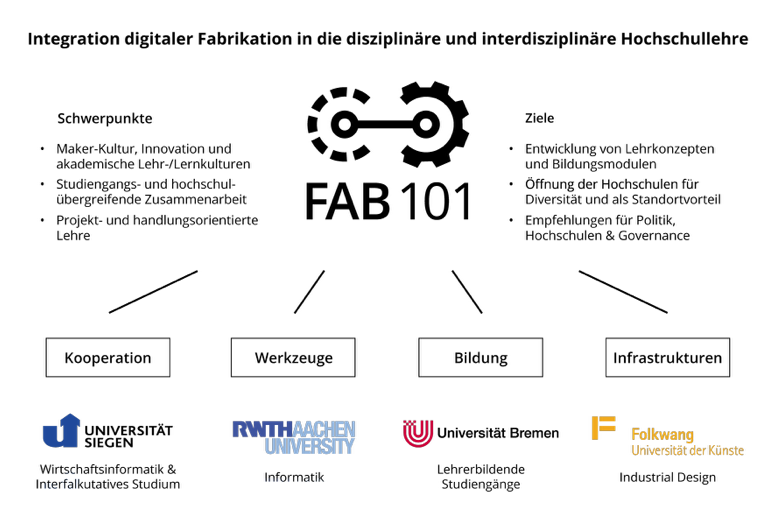
FAB101: Handbuch Fab Labs: Einrichtung, Finanzierung, Betrieb, Forschung & Lehre
We published this open-access book targeted at people who want to open a Fab Lab at a University in Germany. The book should guide you through the process and contains helpful information about setting up such a space and creating a community around it. The book can also be bought at the Bombini publishing company.
FAB101: Digital Fabrication Infrastructures in Interdisciplinary Academic Education
FAB101 is an interdisciplinary project of the University of Siegen (coordinator), RWTH Aachen University, the University of Bremen, and Folkwang University of the Arts. We study concepts for integrating teaching in Fab Labs — digital fabrication laboratories in which students learn, work, and do research using 3D printers, lasercutters, plotters, CNC mills, and microcontrollers — into different curricula and university locations. All four partners are running Fab Labs at their university. We examine infrastructural requirements of university Fab Labs, such as organizational and work safety related issues. We create recommendations for how to set up, equip, and embed Fab Labs into universities and other institutions.
FAB101 is supported by the German Ministry of Science and Education (BMBF) within its Digital Academic Education initiative from March 2017 until May 2020.
A blog post for the "Hochschulforum Digitalisierung" by project partner Dr. Melanie Stickel from the University of Siegen gives an overview of some of FAB101's findings (in German): Fab-Labs und Makerspaces als digitale Hochschulinfrastruktur – Potentiale offener Werkstätten für eine offene Hochschule
Contact: Anke Brocker
Our FAB101 Project Publications
- Iris Bockermann, Jan Borchers, Anke Brocker, Marcel Lahaye, Antje Moebus, Stefan Neudecker, Oliver Stickel, Melanie Stilz, Daniel Wilkens, René Bohne, Volkmar Pipek and Heidi Schelhowe. Handbuch Fab Labs. Bombini Verlag, August 2021.


- Melanie Stilz, Iris Bockermann, Daniel Wilkens and Anke Brocker. Fab Labs als neue Bildungsorte in der Hochschullehre. In Hochschulen im digitalen (Klima)Wandel Tagungsband zur 3. Online-Tagung Hochschule digital.innovativ, phbhochschulschriften, pages 117–123, E. Weber Verlag GmbH, Incollection, January 2021.

- Frederik Menke. Tracking Manufacturing Workflows in Makerspace Environments. Bachelor's Thesis, RWTH Aachen University, Aachen, March 2020.


- Patrick Feser. Foundations of Interactive Jewelry: Understanding Crafting Practices. Master's Thesis, RWTH Aachen University, Aachen, December 2019.


- Kirill Timchenko. SoRoCAD: A Tool to Design Shape Changes in Soft Robotics. Bachelor's Thesis, RWTH Aachen University, Aachen, October 2019.


- Patrick Bayer. SoRoLib: Library of Building Blocks for Pneumatic Shape Changing in Soft Robotics. Master's Thesis, RWTH Aachen University, Aachen, September 2019.


- Anke Brocker, Simon Voelker, Tony Zelun Zhang, Mathis Müller and Jan Borchers. Flowboard: A Visual Flow-Based Programming Environment for Embedded Coding. In Extended Abstracts of the 2019 CHI Conference on Human Factors in Computing Systems, CHI EA '19, ACM, New York, NY, USA, May 2019.




- Mitski Piekenbrock. Smart Jewelry: Appearance-changing Necklaces and Emotions. Bachelor's Thesis, RWTH Aachen University, Aachen, March 2019.


- Oliver Stickel, Melanie Stilz, Anke Brocker, Jan Borchers and Volkmar Pipek. Fab:UNIverse - Makerspaces, Fab Labs and Lab Managers in Academia. In Proceedings of the FabLearn Europe 2019 Conference, FabLearn Europe '19, pages 19:1–19:2, ACM, New York, NY, USA, 2019.



- Oliver Stickel, Anke Brocker, Melanie Stilz, Antje Möbus, Iris Bockermann, Jan Borchers and Volkmar Pipek. Fab Lab Education in German Academia. pages 8,July 2018.



2021
2020
2019
2018
FAB101: Digitale Fabrikationsinfrastrukturen in der interdisziplinären Hochschulbildung
FAB101 ist ein interdisziplinäres Verbundprojekt der Universität Siegen (Verbundkoordination), RWTH Aachen, Universität Bremen und Folkwang Universität der Künste. Wir beforschen praxisnah Konzepte für eine studiengangs- und hochschulübergreifende Lehre in Fab Labs, digitalen Fabrikationslaboren, in denen mit 3D-Druckern, Lasercuttern, Plottern, CNC-Fräsen und Mikrocontrollern gemeinsam gelernt, gearbeitet und geforscht wird. Alle vier Hochschulen betreiben eigene Fab Labs vor Ort. Darüberhinaus untersuchen wir strukturelle Rahmenbedingungen wie z.B. die organisations- und sicherheitstechnische Einbettung von Fab Labs an Hochschulen, und wir erstellen Empfehlungen für eine solche Einbettung und die hard- und softwaretechnische Ausstattung von Fab Labs an Hochschulen.
FAB101 wird vom März 2017 bis Mai 2020 vom Bundesministerium für Bildung und Forschung (BMBF) im Rahmen des Förderprogramms Digitale Hochschulbildung gefördert.
Kontakt: Anke Brocker
Internal pages (registered users only)


